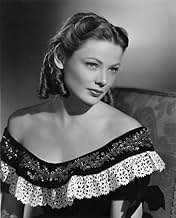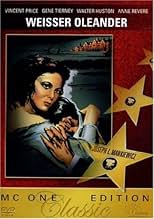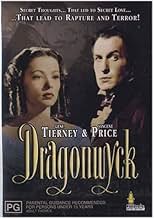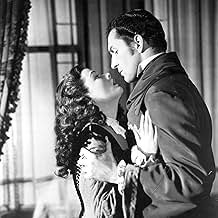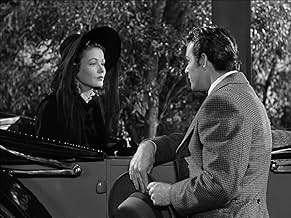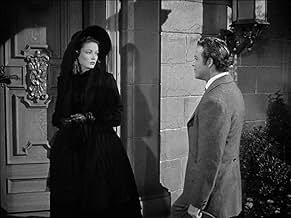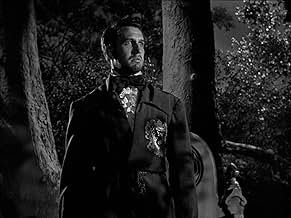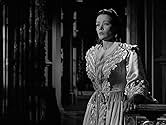A simple Connecticut farm girl is recruited by a distant relative, an aristocratic patroon, to be governess to his young daughter in his Hudson Valley mansion.A simple Connecticut farm girl is recruited by a distant relative, an aristocratic patroon, to be governess to his young daughter in his Hudson Valley mansion.A simple Connecticut farm girl is recruited by a distant relative, an aristocratic patroon, to be governess to his young daughter in his Hudson Valley mansion.
- Director
- Writers
- Stars
- Awards
- 3 wins total
- Klaas Bleecker
- (as Henry Morgan)
- Nurse
- (uncredited)
- Farmer
- (uncredited)
- Boy Dancer
- (uncredited)
- Farmer
- (uncredited)
- Tom Wilson
- (uncredited)
- Farmer
- (uncredited)
- Man
- (uncredited)
- Director
- Writers
- All cast & crew
- Production, box office & more at IMDbPro
Featured reviews
I could tell you that I watched 'Dragonwyck' to enjoy the earliest available film from director Joseph L. Mankiewicz, but you and I both know this to be untrue: I watched it because of Gene. Her mere presence is enough to brighten up even the darkest drama, displaying a graceful poise even as the picture's innocent and vulnerable heroine. Price, in one of his early, largely-neglected roles, is absolutely wonderful, a simmering melting-pot of self-pride and contempt, obscured behind a icy blue-eyed stare. He obviously relished the opportunity to play a tyrannical aristocrat wife-hater, though his drug addiction (presumably to opium) regrettably remains unexplored beyond a brief mention. Glenn Langan, playing the obligatory nice-guy character, is a largely uninteresting creation, serving only to remind us that it's the raving maniacs whom we enjoy watching the most. Cinematographer Arthur C. Miller pulls out the usual photographic tricks, turning the looming Dragonwyck estate into a moody mansion of shadows and suffused light.
The screenplay was adapted by Mankiewicz from a novel by Anya Seton, and, despite the story's clear derivation from previous films, his writing is adequate if unremarkable. Some elements have undoubtedly aged, most especially Miranda Wells' ecstatic Bible-school exclamation of "golly Moses!," and nowadays Nicholas' fervent atheism doesn't seem like quite the evil quality it was sixty years ago. The story itself also feels half-cocked, the screenplay skipping key moments of the narrative, as though with the understanding that we've seen enough of these sorts of films to fill in the gaps ourselves. Additionally, and perhaps most damningly, the supernatural subplot of the tragic Van Ryn ancestor who can occasionally be heard playing beautiful music is underexplored to such an extent that I wonder why this was even included to begin with. But, of course, in my haste to criticise, I'm neglecting to mention the finer points of Mankiewicz's screenplay, with plenty of sharp dialogue and strong characterisations for the most part. This isn't 'Rebecca,' but it's worth a look.
I always had trouble accepting Tierney as poor farm girls. Once she puts on a ballgown she becomes more like herself while Price, in the best of his early roles, is excellent as the rich patroon, (that's basically a landowner to you and me), and there's good work, too, from Walter Huston and Anne Revere, (everybody's mother in the movies), as Tierney's parents. Only the dreadfully wooden Glenn Langan, (he grew up to be "The Amazing Colossal Man"), hampers proceedings as the local doctor in love with Tierney.
It's certainly a handsome looking picture. beautifully designed and photographed in black and white by the great Arthur Miller, and there's oodles of plot to be getting on with. In the Mankiewicz canon, it's been somewhat overlooked but it's very enjoyable; 'a women's picture' to be sure but one with a very sturdy backbone.
A high drama, historical drama, and drama drama. And the drama part works, so that's most of the movie. It's a fairly stiff arrangement, however, including the purposely stiff Vincent Price, who plays a noble Dutch American (a patroon) with a fabulous estate on the Hudson. Director Mankiewicz is great at nuanced characterizations, including a zealous father played by Walter Huston. This may not be his best product, but it's rich with details and lush textures both visually and in the narrative, and it gets more intense as the small events come to conflict by the end.
What sometimes hobbles the whole thing is the simplified tenant farmer revolt, whatever its roots. (I live near to where this is fictionally set, and there is no trace of this kind of culture at all here, just some place names, and I have a suspicion it was never this exaggerated, not in the 1800s, though perhaps in the 1600s, when the Dutch really ruled the area, then called New Netherland.) The pageantry, the great house, the storms, and the big dances, all of this is romantic Bronte territory, well done, and great atmosphere. The music by Alfred Newman and the photography by Arthur C. Miller, both great talents at their professional best, do their usual best, as well.
So what works best, beyond the overall mood, is the presence of the two women: the visiting niece of course, the star, Gene Tierney, and equally, in a subtle way, Connie Marshall, the suffering wife of the patroon. Tierney has a kind of cool reserve that works here, letting the light work on her pretty head. Eventually, the handsome doctor's role takes on more complex importance (played by Glenn Langan), and Price has a fine end, which Price fans will greatly admire.
If you enjoyed _My Cousin Rachel_ (another tragically elusive film!) or the Orson Welles _Jane Eyre_, you'll probably have a good time with _Dragonwyck_. The classic elements are there: lovely, innocent heroine (Tierney); brooding, mysterious, wealthy man (Price); luxurious yet sinister mansion; ghostly and/or murderous plot twists. One plot twist will probably come as absolutely no surprise, given the relentless typecasting of Price (has he ever been a good guy, except in _House of the Seven Gables_? --another great gothic, by the way). Nevertheless his character has touches of subtlety and surprising developments. Tierney's character is perhaps less subtly shaded but does develop nicely over the course of the movie. Jessica Tandy is quite fun in an energetic supporting role, and Tierney's stern, craggy father is another strong supporting character.
Few have probably read the novel that inspired the film, but after seeing the film I sought out the source and I have to say the film tightens up the story considerably. Certainly it makes changes, but overall the film is more satisfying in many ways. It may not be quite in the company of such classics as _Rebecca_ and _Jane Eyre_, but it's nonetheless a lot of fun.
I loved the scenes with Price's first wife, who is obsessed with food. In fact, I found the movie curiously disjointed. In the first half of the film, Spring Byngton plays a rather daft "Mrs. Danvers" type, and then she vanishes from the movie without any mention made of it (Not even "We had to fire that old bid d y.") Likewise the haunted daughter from the patroon's first marriage. She had a couple of powerful scenes, and then she was gone without a word. (Not even "Gee, too bad she died of scarlet fever.")
I never would have guessed that Mankiewicz was the director of this film. (Well, perhaps in the scene in which the aristocratic women were making sport of Tierney's commonness.) Very powerful Gothic atmosphere in the key scenes. A very enjoyable film, especially for Vincent Price fans.
Did you know
- TriviaVincent Price had to work hard could to convince producer Joseph L. Mankiewicz to cast him as Van Ryn. Mankiewicz remembered him as the good-natured guy in Laura (1944) or as a portly prelate in his last film,Les clés du royaume (1944). But determined to convince him, Price lost the 30lbs he had gained for the film, auditioned, and won the coveted role.
- GoofsAs Miranda and Van Ryn dance through the doorway from the balcony into the ballroom, she holds her closed fan in her hand. When the shot changes after they enter the room, the fan dangles from her wrist.
- Quotes
Nicholas Van Ryn: But I will not live by ordinary standards. I will not run with the pack. I will not be chained into a routine of living which is the same for others. I will not look to the ground and move on the ground with the rest: so long as there are those mountaintops, and clouds, and limitless space.
- ConnectionsFeatured in Le château du dragon: fantasme de l'excès (2004)
- SoundtracksCreole Lullaby
(uncredited)
Written by Alfred Newman
Lyrics Charles Henderson
Sung by female voice off camera
- How long is Dragonwyck?Powered by Alexa
Details
Box office
- Budget
- $1,900,000 (estimated)
- Gross worldwide
- $5,434
- Runtime1 hour 43 minutes
- Color
- Aspect ratio
- 1.33 : 1
Contribute to this page



